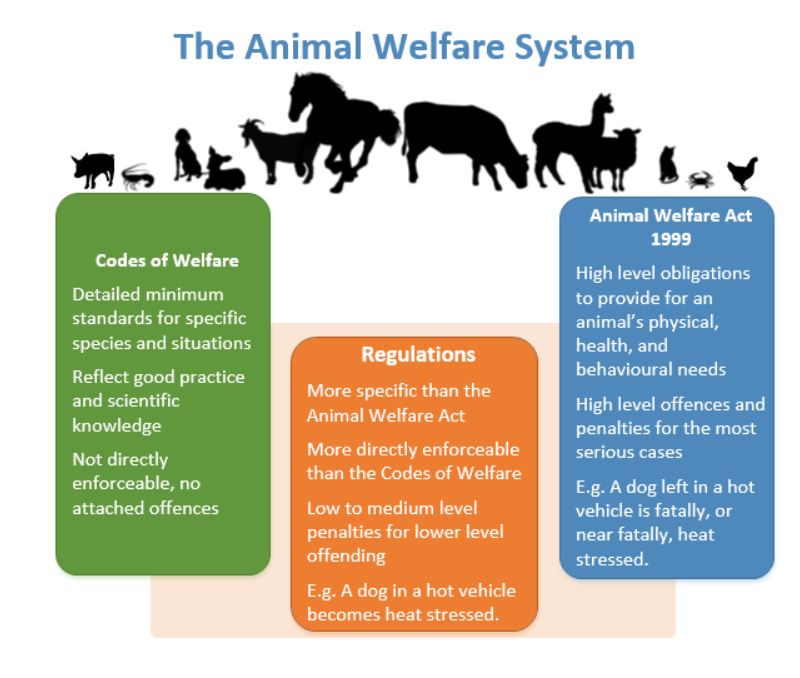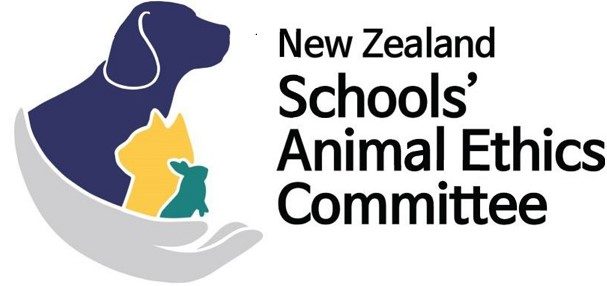Resources for Animal Ethics
Do you need to apply for Animal Ethics Approval? Look at the flow chart to help you understand. If you are unsure, please contact: animalethicscommitteenz@gmail.com

Exemplars of applications for ethical approval:
Click on the links below to open up the PDFs in a new browser window
The code of Ethical Conduct for the use of animals in research and teaching in schools, home schools and early childhood centres.
Resources relating to caring for animals
Caring for Animals: A Guide for Teachers, Early Childhood Educators and Students
This publication explains the proper care of axolotls, goldfish, terrapins, birds, guinea pigs, rabbits, rats, mice, field crickets, slaters, garden snails, and compost worms. It also explains both the ethical and legal obligations for boards of trustees, teachers, early childhood educators, and students, whether they are observing or studying the animal.
Ethical guidelines for students in laboratory classes involving the use of animals and animal tissues, an ANZCCART publication.
- ANZCCART – Ethical guidelines for students
Good Practice Guide for the Use of Animals in Research, Testing and Teaching
- Good Practice Guide. For the use of animals in research, testing and teaching.
- A Culture of Care. A guide for people working with animals in research, testing and teaching.
Using Animals in Science and Teaching
- ANZCCART – Using animals in teaching. Ensuring that the public are well informed about what animal research involves and the role it plays in the overall process of scientific discovery.
The New Zealand Association of Science educators. NZASE
- They coordinate and support many organisations. Membership is open to institutions and individuals that support the objects of the Association.
- The objectives of the Association are:
- To promote the development of science education throughout New Zealand.
- To facilitate liaison and cooperation between regional science teachers’ Associations.
- To assist regional science teachers’ Associations in their efforts to sustain and expand their activities.
- To disseminate information, articles and other material related to science education through newsletters, journals and other means.
- To represent the interests and concerns of people involved in science education to the appropriate authorities.
- To organise conferences of its members to further their knowledge of science education and to enhance their skills and interest.
- To develop links with international science education Associations.
- Such other objects as are deemed by the Council to be ancillary or related to the objects already stated.
Te Rōpū Whakaako Koiora o Aotearoa / Biology Educators of Aotearoa New Zealand. BEANZ – Login required
- Biology Educators of Aotearoa New Zealand (BEANZ) is an incorporated society whose purpose is to support and promote Biology education throughout New Zealand.
- Our focus is on building pedagogy and content knowledge of members through the provision of regular newsletters, regional workshops, resources, website, and scholarships for members to attend relevant conferences, specific projects such as provision of support materials, and the biennial conference, BioLive.
- BEANZ also produces and publishes NCEA level 3 practice examination papers each year as well as other materials to support teachers in assessment practices.
Resources relating to legal requirements
The Animal Welfare Act 1999

The Animal Welfare Act 1999 aims to prevent ill-treatment and inadequate care of animals by imposing requirements on those who own or are in charge of animals.
Five Freedoms and the Five Domains explained:
The Five Freedoms model of animal welfare was first developed in the 1960s and has shaped the development of evidence-based animal welfare standards for many years. The Five Freedoms are recognised internationally by animal welfare groups, NGOs, industries and governments in relation to standards, codes of practice, legislation, policy statements, and quality assurance schemes. They consist of:
- freedom from hunger and thirst;
- freedom from discomfort;
- freedom from pain, injury or disease;
- freedom to express normal behaviour;
- freedom from fear and distress.
The way we think about animal welfare has evolved over the past few years – away from solely meeting the basic needs of animals and minimising negative experiences to encouraging positive experiences and recognising animals’ emotional needs.
The Five Domains model is a framework which aligns closely with the goals of SPCA Certified, as it focuses on how animals feel and allows us to look beyond minimising suffering to strive for a good life for animals.

Guide to Part 6 of the Animal Welfare Act 1999
- Section 6 of the Act refers particularly to the use of animals in research, testing or teaching. The provisions of this section include ethical guidance for decision makers including an express requirement for Animal Ethics Committees, when considering project applications, to be satisfied that the benefits outweigh the harm and to promote the “three R’s” (reduce the numbers of animals used to the minimum, refine techniques so the harm is minimised and benefits maximised, and replace animals where possible with non-living or non-sentient alternatives).

